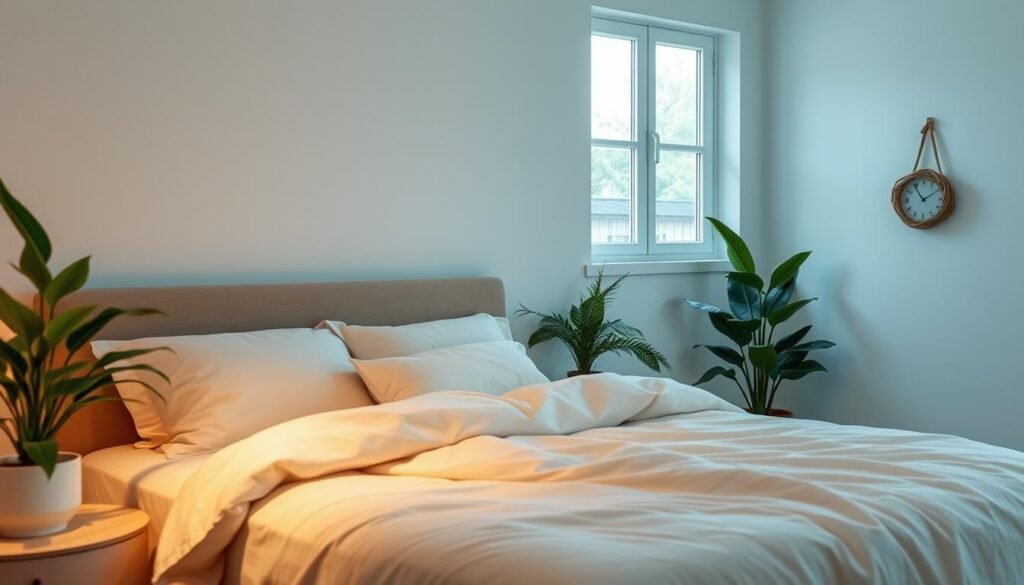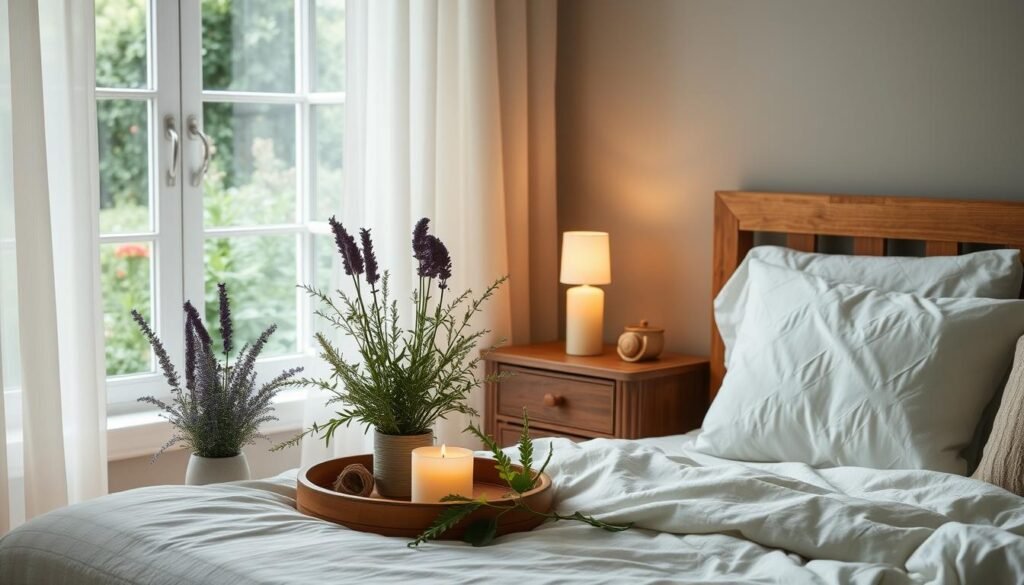Did you know about 76% of people lean towards natural sleep methods over meds? This trend shows a move to whole-body care for sleep troubles. Good sleep is critical—it boosts brain work, keeps emotions in check, and keeps our bodies healthy. Poor sleep can lead to grumpiness, mood flips, and even long-term health issues.
This piece looks at sleep tips that boost sleep quality and health. Using these tips daily can open doors to restful nights and lively days.
Key Takeaways
- Emphasizing holistic methods, 76% of individuals choose natural sleep techniques over medication.
- Consistent sleep schedules promote better sleep quality and align circadian rhythms.
- Engaging in moderate daily exercise can significantly enhance sleeping patterns.
- Natural remedies like herbal teas and essential oils aid in relaxation before sleep.
- Practicing mindfulness and stress management techniques can improve overall sleep quality.
- Quality sleep supports cognitive function, emotional health, and physical wellness.
Understanding the Importance of Quality Sleep
Quality sleep is key to good health and well-being. It helps our immune system work and controls hormones. It also helps our brains process memories and remove toxins. Not sleeping enough can lead to emotional issues and mess with hunger hormones.
The Role of Sleep in Health and Well-Being
Getting enough sleep keeps you mentally and physically healthy. Studies show good sleep lowers the risk of heart disease and obesity. Not sleeping enough can hurt your thinking as much as drinking alcohol. Knowing about sleep helps us take better care of ourselves.
Consequences of Poor Sleep Quality
Poor sleep does more than make you tired. Many kids and adults don’t sleep enough, feeling stressed and sick. Students often don’t learn about sleep, leading to bad habits and health risks.
Quality sleep affects health and how long we live. Not sleeping enough can make us unhappy and less productive. Better sleep policies could help solve these problems, making sure we all sleep well.
To stay healthy, we need to value our sleep. Making bedtime routines and learning about sleep are good steps. This helps everyone live better lives.
Find out more about sleep health and its benefits here.
Common Sleep Disorders and Their Impact
Sleep disorders can hurt our quality of life. Insomnia, the most common one, affects many people. It means having trouble sleeping. This leads to feeling tired, irritable, and less able to think clearly. These issues can make everyday tasks harder.
Insomnia and Its Effects
Those with insomnia may face several problems. They include:
- Decreased productivity
- Increased risk of mood disorders
- Impaired memory and concentration
About 10% of adults have short-term insomnia. Unfortunately, it can turn chronic for 20% of them. Finding ways to help those with sleep issues is crucial.
Sleep Apnea Explained
Sleep apnea is different from insomnia. It causes breathing to stop and start while sleeping. This condition leads to serious health risks like heart problems and stroke. Two main types exist:
- Obstructive Sleep Apnea (OSA) – A blockage causes it in the throat.
- Central Sleep Apnea – It happens when the brain doesn’t tell the body to breathe.
Sleep apnea disrupts good sleep, causing daytime sleepiness and health issues. It often comes with loud snoring, particularly with OSA. Diagnosing it may require sleep studies, like polysomnography.
Techniques for Sustainable Sleep
For restful nights, start with a regular sleep schedule. Aim for 7-9 hours of sleep each night. This regularity helps your body’s clock and boosts health.
Set times for going to bed and waking up the same each day. These habits lead to better sleep quality over time.
Establishing a Consistent Sleep Schedule
A steady sleep routine is key for a balanced life. Cut back on screen time to under 2 hours before bed. It really helps.
Avoiding caffeine and alcohol before sleep is also important. Try not to drink them 3-7 hours and 3-4 hours before bed, respectively. Also, don’t drink a lot of water right before sleeping to minimize waking up at night.
Creating a Calming Pre-Sleep Routine
A calming routine tells your body it’s time to relax. Reading, stretching, or meditation are great before bed. These activities make your mind ready for sleep.
Make your bedroom a calm place just for sleep. Using sleep trackers, such as the Coros Apex 2 Pro Premium multisport watch, helps too. They track your sleep quality and length.
Using these sleeping methods improves your well-being. For more help, try natural sleep aids. They might offer the insight you need.
Optimizing Your Sleep Environment
An optimal sleep environment is key to getting good sleep. Small changes can improve your sleep a lot. Focus on comfortable bedding and control the room’s temperature and light.
Choosing the Right Bedding
Good bedding is crucial for quality sleep. A medium-firm mattress supports your sleep posture and reduces discomfort. The right pillows add to a great night’s sleep. Change your bed sheets regularly to keep away allergens that disturb sleep. Clean bedding makes your sleep space inviting.
Temperature and Light Control
Keeping the right temperature is important for sleep. Aim for 60-67°F for the best sleep. Blackout curtains block outside light, helping you produce melatonin for deep sleep. Wearing socks can make you feel more comfortable in a cool room. Temperature and light control greatly affect sleep quality. For more sleep tips, visit this resource.

Methods to Enhance Sleep Hygiene
Improving overall health starts with a peaceful and restful sleep environment. Keeping the bedroom clean is key for good sleep hygiene. A tidy space helps you relax and sleep better. Small efforts can make a big difference in sleep quality.
The Importance of Cleanliness
A clean sleeping area is more comfortable and relaxing. Clutter can distract you and make it hard to fall asleep. By cleaning regularly, you reduce allergens that disturb sleep. Simple actions like washing your bedding weekly matter a lot.
Minimizing Distractions Before Bedtime
To sleep well, you need to cut down on distractions. It’s smart to stop using electronics an hour before bed. This helps your brain get ready for sleep. Trying controlled breathing can also ease the shift to sleep.
| Tip | Description |
|---|---|
| Keep a Regular Sleep Schedule | Consistently going to bed and waking up at the same time daily is crucial. |
| Avoid Caffeine and Heavy Meals | Avoiding these close to bedtime can help you sleep better. |
| Optimize the Sleep Environment | A cool room, around 65-68°F, is best for sleeping. |
| Incorporate Relaxation Techniques | Practices like meditation can greatly improve your sleep. |
| The Role of Daylight | Daylight exposure supports your body’s natural sleep cycle. |
Using these techniques will majorly boost your sleep hygiene. For more tips on sleep improvement, visit here. A quiet, clean sleeping area is vital for your body to rest well.
Natural Sleep Remedies for Restful Nights
Many adults struggle with insomnia, looking for natural sleep remedies. Herbal teas and essential oils are top choices. They help calm your mind and improve sleep. Making them part of your bedtime routine can make a big difference.
Herbal Teas and Their Benefits
Herbal teas like chamomile, lavender, valerian, and passionflower help you sleep. A 2016 study shows chamomile improves sleep quality for postnatal women. Valerian root has helped postmenopausal women sleep better after a month. Also, nonalcoholic beer with hops has been found to improve sleep in college students.
If you want to try these herbal teas, picking the right one and how you make it matters. Brewing these herbs properly releases their benefits. It’s a great thing to enjoy before bed.
Using Essential Oils for Relaxation
Essential oils like lavender and bergamot are popular for relaxation. Using them in diffusers or applying them to your skin can help you unwind. A 2015 study found lavender particularly good at improving sleep quality for new moms.

Trying essential oils for sleep with herbal teas can tackle insomnia naturally. This combination eases anxiety and prepares you for sleep. It’s a great way to find the peace needed for a good night’s sleep.
Mindfulness and Relaxation Techniques
Adding mindfulness techniques to daily life can really help with sleep. These methods can reduce stress, which often ruins a good night’s sleep. Breathing exercises and yoga are two great ways to get calm before bed. They help prepare your mind and body for a restful night.
Breathing Exercises for Calmness
Breathing exercises are a key way to calm your mind. Taking slow, deep breaths can make your heart rate go down and lessen anxiety. This brings peace before you sleep. Studies show focusing on the present moment with these exercises boosts your ability to handle stress. Doing them regularly helps you deal better with things that might keep you awake.
Yoga and Gentle Movement Before Sleep
Doing light yoga or gentle movements helps with sleep, too. These activities stretch your muscles and increase mindfulness. Many say their sleep gets better after doing yoga. A bedtime routine with these exercises can help your body start to relax. This makes falling asleep easier. Understanding how connected our minds and bodies are helps tackle sleep issues caused by stress and anxiety.
| Technique | Description | Benefits |
|---|---|---|
| Breathing Exercises | Slow, deep breaths focusing on the present | Reduces anxiety, lowers heart rate, enhances focus |
| Yoga | Gentle movements and stretches before sleep | Improves flexibility, promotes relaxation, improves sleep quality |
Nutrition’s Role in Sleep Quality
Nutrition is key to good sleep every night. Choosing the right foods helps achieve deep sleep. Including sleep-promoting foods in your diet boosts your well-being. Foods like leafy greens, nuts, and seeds are high in magnesium. They relax the body and help you sleep better.
Foods that Promote Sleep
Some foods are great for sleep quality. Here are a few:
- Turkey – It has tryptophan, which helps you sleep.
- Chamomile tea – Its calming effect helps in winding down.
- Kiwi – Packed with antioxidants and serotonin, it aids sleep.
- Fatty fish – The omega-3s in it help regulate sleep.
- Almonds – Their magnesium content helps muscles relax.
Eating these foods in the evening helps create a comfy routine. This routine makes falling asleep easier. Tracking nutrition and sleep can boost your health over time.
Avoiding Caffeine and Heavy Meals
Avoiding caffeine and big meals before bed is important. Caffeine, in coffee and some sodas, can disrupt sleep. It’s best to cut down on caffeine before bedtime. Heavy meals might keep you awake at night. Opt for light snacks to encourage sleep.

Being mindful about what you eat changes sleep quality and health. Balancing nutrition and sleep improves your mood and mental health.
Tech and Tools for Better Sleep
Today’s tech advances offer many ways to improve sleep quality. There’s a focus on using technology to sleep better. This has led to the creation of tools that help people sleep more effectively.
Sleep Apps and Wearables
Sleep apps on smartphones are getting popular for sleep tracking. Apps like Sleep Cycle, Pillow, and SleepScore monitor sleep. They track how long you sleep and the quality of it. These apps give tips to better your sleep habits. A study by Casper and Gallup shows only a third of Americans feel they sleep well. This indicates a big need for better sleep solutions.
Wearables like Oura Ring 3 and Whoop Strap 4.0 also help with sleep. They track heart rate, body temperature, and even illness signs. The rise in sleep technology shows that new solutions are quickly being developed. As of now, there are 98,136 tech solutions in 131 categories aimed at improving sleep.
White Noise Machines and Sleep Earbuds
White noise machines and sleep earbuds help block outside noise. They can make sleeping easier by producing soothing sounds. Look at Dohm and LectroFan, they offer a variety of sounds. Using these can help you sleep better and improve your health by lowering stress.
Apps, wearables, white noise machines, and earbuds are all part of a trend. They show how tech is becoming a key part of sleeping better. By using these tools, people can change how well they sleep. For tips on using energy-efficient sleep technology, check out this resource.
Conclusion
Getting good sleep is crucial for our health. It’s the base of our overall well-being. To sleep better, it helps to follow advice like keeping a regular sleep time. Also, using natural sleep aids with chamomile and lavender can help.
There are many ways to improve sleep. Practices like mindfulness and making your sleeping area better can make a big difference. Also, using technology wisely, like sleep apps, helps a lot. These apps use tracking and feedback to help us sleep better. People now prefer eco-friendly products. This includes items with natural ingredients and packaging that’s good for the environment.
To really improve sleep, it’s best to use a mix of methods. By focusing on quality sleep, you can use resources like natural sleep drops and technology. This will help you have better mental health and a more balanced life.